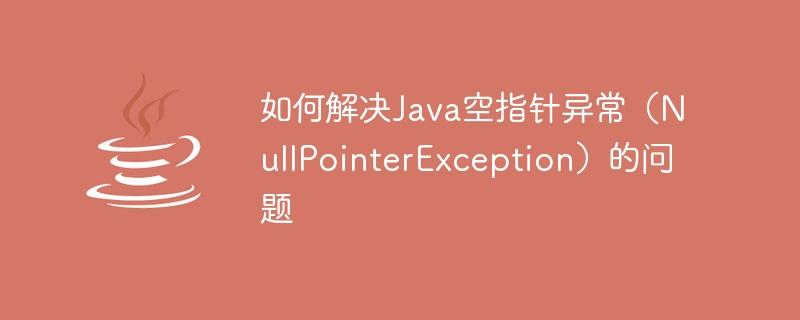Home >Java >javaTutorial >How to solve the problem of Java NullPointerException (NullPointerException)
How to solve the problem of Java NullPointerException (NullPointerException)
- WBOYWBOYWBOYWBOYWBOYWBOYWBOYWBOYWBOYWBOYWBOYWBOYWBOriginal
- 2023-08-17 23:05:093448browse

How to solve the problem of Java NullPointerException
Introduction:
In Java development, NullPointerException is a common runtime errors. When we reference a method or property of a null object in code, a null pointer exception is thrown. In order to solve this problem, several common methods will be introduced below.
1. Avoid using empty objects
In the programming process, we should try to avoid using empty objects. Before using an object, you must first make a non-null judgment on the object. For example:
public void doSomething(Object obj) {
if (obj != null) {
// 对象非空时的操作
} else {
// 对象为空时的处理逻辑
}
}In this way, we can avoid referencing methods and properties of null objects, thus avoiding throwing null pointer exceptions.
2. Use conditional judgment statements
Before referencing the methods and properties of the object, you can use conditional judgment statements to perform null processing. For example:
public void doSomething(Object obj) {
if (obj == null) {
// 对象为空时的处理逻辑
} else {
// 对象非空时的操作
}
}In this way, you can determine whether the object is null before using it, thereby avoiding throwing a null pointer exception.
3. Reasonable use of try-catch statements
When using object methods, you can use try-catch statements to capture null pointer exceptions and handle them accordingly. For example:
public void doSomething(Object obj) {
try {
// 使用对象的方法
} catch (NullPointerException e) {
// 处理空指针异常的逻辑
}
}By using the try-catch statement, you can catch the null pointer exception and handle it accordingly when the exception is caught, thereby avoiding program crash.
4. Use assertion statements
In the code, you can use assertion statements to determine whether the object is empty. If empty, an assertion exception is thrown. For example:
public void doSomething(Object obj) {
assert obj != null;
// 使用对象的方法
}By using assertion statements, the object non-null judgment can be explicitly made in the code. Once a null object is referenced, an assertion exception will be thrown.
5. Use Optional type
After Java 8, the Optional type was introduced to solve the problem of null pointer exception. The Optional type can encapsulate the value of an object, and users can obtain the encapsulated object value through a series of methods to avoid null pointer exceptions. For example:
public void doSomething(Object obj) {
Optional<Object> optional = Optional.ofNullable(obj);
if (optional.isPresent()) {
// 对象非空时的操作
} else {
// 对象为空时的处理逻辑
}
}By using the Optional type, you can operate objects more safely and avoid the occurrence of null pointer exceptions.
Summary:
NullPointerException is a common Java runtime error, but we can avoid using empty objects, use conditional judgment statements, and rationally use try-catch statements , use assertion statements and use Optional types and other methods to solve this problem. In daily development, we should develop good coding habits and avoid the occurrence of null pointer exceptions to improve the quality and stability of the code.
Reference code:
public class NullPointerExceptionExample {
public static void main(String[] args) {
String str = null;
System.out.println(str.length());
}
}The above code will throw a null pointer exception. We can use conditional judgment statements to avoid this problem:
public class NullPointerExceptionExample {
public static void main(String[] args) {
String str = null;
if (str != null) {
System.out.println(str.length());
} else {
System.out.println("对象为空");
}
}
}Through this processing, even if str is null, it will not throw a null pointer exception, but output "the object is null". This processing method can effectively avoid the occurrence of null pointer exception.
The above is the detailed content of How to solve the problem of Java NullPointerException (NullPointerException). For more information, please follow other related articles on the PHP Chinese website!

